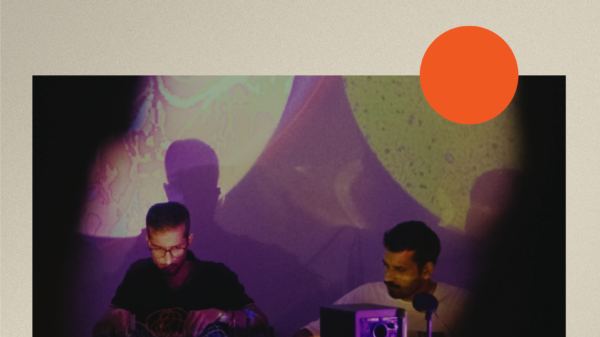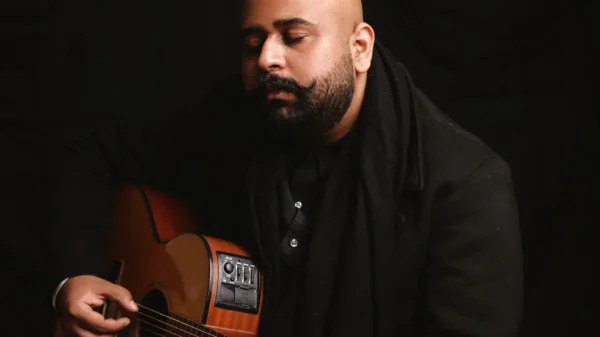With the world coming to a stand-still, the artist community is bustling with activity. Live streams, releases, social media based interactive sessions and more. Various artists in the independent music space have also used this time to release new material. Indian Ocean, the Delhi based progressive fusion rock legends, too have taken this period to come out with their latest single, a rendition of a classic by Nusrat Fateh Ali Khan, ‘Akhiyan Udeek Diyan’.
The process of this recreation has been a rather arduous one with the band members starting out with great apprehension towards approaching music made by their musical hero as well as excited about the challenge it brought. The band’s lead guitarist Nikhil Rao says “Each song has its own journey and we usually scratch around in the darkness for a while before one of us has a breakthrough. Once we have that germ of a half-interesting idea, we build on it, egg each other on, encourage and critique each other’s ideas, take endless chai breaks and this can go on for many weeks and months till everyone is convinced we are done. Then we record the song, incorporate some on the spot “Aatma ki Pukaar” changes if required.And then we prepare to present a live version of the composition which often changes and keeps evolving as we play it more and more.”
Indian Ocean has always been known for their talent to tap into their folk, Indian classical and traditional roots and give their own progressive rock spin to whatever they pick. This release is no different. In fact the release sprouts from an initiative by Times Music (a music label of The Times group), who asked the band to record it as part of an album where independent musicians make versions of Nusrat Sahab’s Qawwalis. Amit Kilam, the band’s drummer and percussionist, comments that Nusrat Sahab is his favourite artist and maybe someday he would have anyway attempted to do something like this on his own. What we obtain from the band as the final product, is a new version of ‘Akhiyan Udeek Diyan’ that bears little resemblance to Nusrat Fateh Ali Khan’s, but is very ‘Indian Ocean’ at its core. “To me this song showcases a new side of Indian Ocean. We attempt to break fresh ground, go to places we haven’t before. We incorporate the diverse influences of all 5 of us individually and explore the common ground between us (which is why we play together in the first place). I think of Akhiyan Udeek Diyan as a brand new composition rather than a cover version of an iconic Nusrat Sa’ab song. We tried our best to pay respect to the breadth and depth of the music he pursued but time and people will tell if we did a decent job.” says Nikhil Rao.
But how does one approach a classic like that? One that has been adored by millions of listeners all over the world and adapt it in your own sound. “Well it all opens up with a lot of nothingness and staring into a blank space because you really don’t have much idea of how to go about, how to start the process of touching up a classic. You want to do it but at the same time you have apprehension about it. It took a little bit of time but then as we slowly started getting into it and we got a few things going, then the brain started working on a tangent. My aim was to make it sound nothing like the original and take away the natural Qawwali vibes to begin with.”

With interest in traditional forms of music declining, the question of a disconnect with the younger generation arises. Amit Kilam says that “I do not think that the younger generation is disconnected at all. In fact, I think that the younger generation is the only one that can remain connected and yet want to do other things also. Just as it happens, with passage of time, young people adapt to newer music, experiment with their choices, but remain connected. It’s just that sometimes companies and producers who make music want to just keep selling one kind of music to people, thinking that it is what is working. In fact people are far smarter than all these people together. They consume a lot of different music. When the last Qawwali came out in Bollywood, it was a rage. So people are really connected to folk music and it’s a myth that they are not. It’s just we’re selling them only one or two kinds of things and they’re forced to consume that.” Nikhil has a different take on this. He says “A lot of the new music is awesome and I love listening to it. Culture and tastes change all the time and this isn’t a bad thing. There is a fair bit of the lowest common denominator and low hanging fruit type of music but this isn’t new at all, it always existed. Music when sincerely presented will eventually find its audience. The one thing the internet teaches us (apart from fucking up our attention spans permanently) is that everything exists all at once and making sweeping statements of any kind only shows the ignorance of the speaker. The dirty exists alongside the beautiful, the crass alongside the sublime and that really is the human condition, isn’t it?”.



























